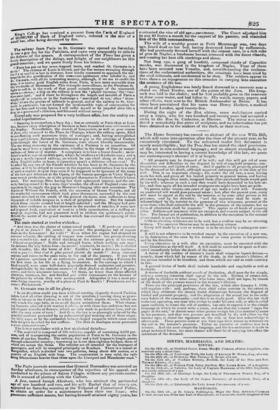'1'he Home Secretary has caused an abstract of the new
Wills Bill, which will come into operation after the close of the present year, to be extensively circulated. To the unlearned reader this document is nearly unintelligible ; but the True Sun has stated the chief provisions of the act in non-technical language ; and as almost everybody is, or may be, interested in having a correct knowledge of this law, we quote our contemporary's abstract of it at length.
" All property may be disposed of by will ; and this will get rid of some obscurities and difficulties in the disposal by will of copyliold property, con• tingeut interests, and rights of entry. And it applies to all property possessed by the deceased at his death, although acquired subsequently to the date of/us will. This is an important change ; for, under the old law, a man having made his will, and given all his landed property in general terms, and having afterwaids bought other lands, imagined these after. purchased lands would pass by his will ; Whereas in such a case they would have descended to his heir-at- law, and thus again all hi, intended arrangements might have been set aside. No person under twenty-one years of age can make a valid will. Formerly an unattested will would pass personal estate ; butt, after the present year, every will must be signed at the end by the testator, or by some other person in his presence, and by his direction ; and the signature shall be made or acknowledged by the testator in time presence of two witnesses, present at the same time, who shall subscribe the will in the presence of the testator, but no Cum of attestation shall be requisite." This applies to all kinds of property alike. Soldiers and mariners' wills are excepted, and remain subject to the old law. The formal act of publication, in addition to the execution in the manner
at stated, is not to be necessary.
Gifts to attesting witnesses are tube void, but a creditor may be an attesting witness. he executor likewise may be an attesting witness.
Every will made by a man or woman is to be revoked by a subsequent mar-
riage. A will is not otherwise to be revoked except by the execution of a new one, or by destruction of the same by the testator or some person in his presence, and by his direction.
Every alteration in a will, after its execution, must be executed with the same formalities as the will itself. A will shall be construed to speak as if exe- cuted immediately before the death of the testator. A devise of tine residue of testator's lands shall comprise lapsed devises,— namely, those which fail by reason of the death, in the testator's lifetime, of the person intended to be benefited, and those which are void as made contrary to law.
A general devise of lands shall include leaseholds and copyholds as well as freeholds.
A devise of freeholds without words of limitation, shall pass the fee simple, unless a contrary intention shall appear by the will. Devises of estates tail, and gifts to children or other issue, who leave issue, shall not lapse, by reason of the death of the persons named in the testator's lifetime. These are the principal provisions of the law, which after January 1, 13:19, will regulate wills : and, perhaps, their chief value consists in the extent to which they obliterate the absuld feudal distinctions between the disposal of landed and personal property, and the adaptation of the actual law to the ordi- nary habits of the community—and this is no slight good. After this law shall come into operation, any man who wishes to make his own will, or who is called upon suddenly to frame the will of another, has only to express it in the simple language in whick he would write a letter, and see that time testator " signs the paper at time end," or directs sonar other person to sign his (the testator's) name in his presence, and that two persons not benefited !my tin will either see the
testator sign, ol direct the signature of, the will, or hear him acknowledge it
afterwards. These persons twist at one time sign their names as witnesses on the will in the testator's presence. Either an executor or creditor may be a
witness. And the more simple the language, and the less endeavour is made to adopt technical forms, the more chance will there be of carry Mg into effect the intentions of the deceased.


























 Previous page
Previous page